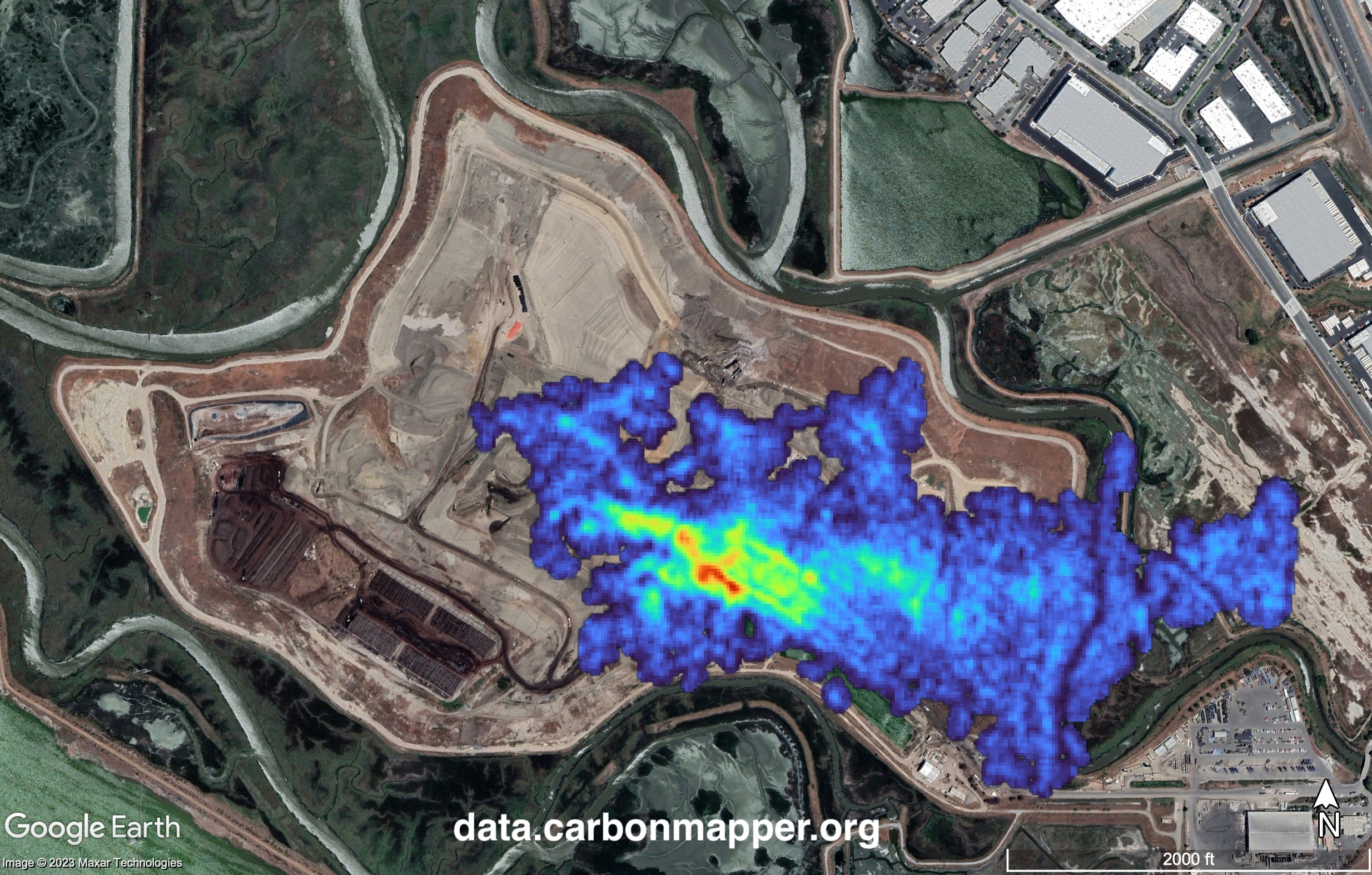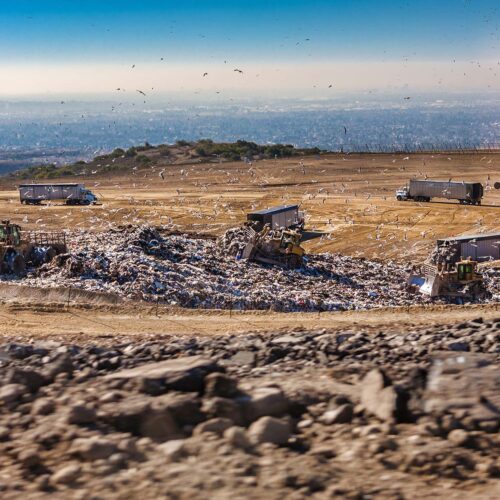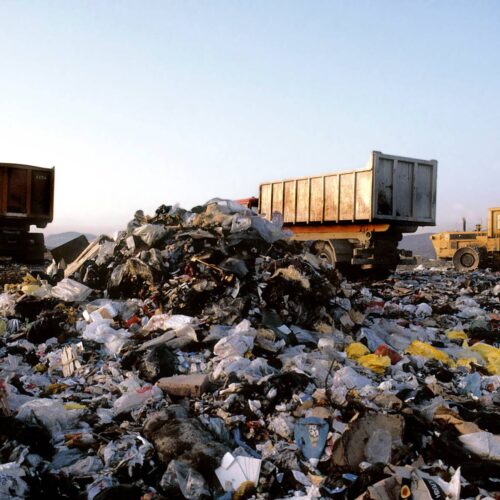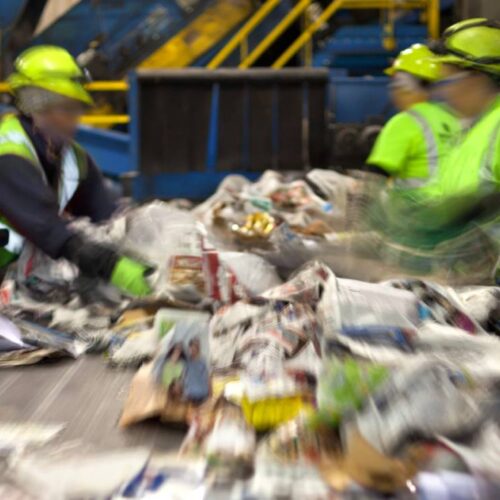Article

Managing Methane in the Waste Sector
Waste Sector: Methane Emissions Flying under the Radar
Did you know your household waste is a major contributor to climate pollution and warming? You are probably familiar with trash polluting our waterways and parks, but it has consequences beyond what we can see in our environment.
Food waste and other organic household materials like paper, wood, yard waste, and sewage sludge often wind up in landfills, where they decompose under anaerobic conditions to produce landfill gas (LFG), comprising primarily methane and carbon dioxide. The waste sector — landfills and wastewater — accounted for almost 20 percent of all human-related methane emissions — the third largest source globally, after livestock and oil and gas emissions.
Methane is responsible for about 30 percent of the current increase in global temperature since the pre-industrial era. So far, curbing methane emissions has focused on the oil and gas sector, but the waste sector has a clear and urgent need for decarbonization strategies that swiftly reduce emissions, and sustained reductions are critical for improving air quality and preventing dangerously high temperatures worldwide.
A Growing Problem
Though it has gotten less attention, methane is a super-pollutant which has a short atmospheric lifetime, about 84-86 times the global warming impact of carbon dioxide on a 20-year timescale. More than half of methane emissions can be attributed to human activity, so it’s no surprise that the atmospheric concentration of methane is rising rapidly.
A growing global population with higher purchasing power is driving increased consumption and waste generation. And solid waste disposal in the fastest-growing populations — sub-Saharan Africa, South Asia, and the Middle East and North Africa — are often unmanaged dumps, increasing public health risks and methane emissions. In 2020, global human-caused methane emissions from municipal solid waste landfills alone had the same warming impact as approximately 4.4 billion metric tons of CO2 on a 20-year time horizon. That’s equivalent to the annual emissions from about 950 million passenger vehicles.

Methane plume from a landfill collected from airborne remote sensing survey using AVRIS-NG. Provided by Carbon Mapper.
Fortunately, methane’s short lifetime means that mitigating relatively small amounts of methane can have significant near-term impacts on climate change, and methane abatement solutions can be readily deployed today. Source reduction, organics diversion, LFG capture, and more sustainable production and consumption are critical to emissions reductions in the waste sector. At the same time, reducing greenhouse gas emissions sufficiently will require clear plans and policies, as well as buy-in from the private sector, governments, and the communities they serve.
Article
Article
Cutting Methane at the Source — And Everywhere Else
By adapting the waste management hierarchy to methane management, we can prioritize methane mitigations solutions across the waste value chain with preferred solutions like source reduction and reuse (e.g., food waste prevention) and organics diversion for compost or biogas or other beneficial use. Notwithstanding a one hundred percent prevention and/or diverting organic waste from landfills, methane emissions from previously buried organic matter will remain a threat for decades to come. Therefore, complementary solutions that optimize methane capture through dumpsite upgrades and better landfill design and operations paired with comprehensive emissions monitoring are necessary.
Source: Adapted from “Comparative Greenhouse Gas Emissions Analysis of Alternative Scenarios for Waste Treatment and/or Disposal,” County of Los Angeles Department of Public Works, 2016
If we begin to value waste as a resource as valuable as energy, we can appreciate the value in reducing, reusing, and recycling. Your banana peels or eggshells from your morning meal, if sent to a landfill, will decompose to produce methane, and energy and nutrients that were used to grow them will be forever lost. However, diverting the same banana peel and eggshells to be treated through anaerobic digestion or composting will allow the recovery of biogas for energy and digestate — or compost, for nutrient recovery. Even better: reduce food loss in the first place and make sure unused food is going toward feeding others before being treated as waste.
RMI is working with partners globally to identify the biggest levers for methane reduction, develop data products that will inform actionable emissions cuts, share insights with key industry stakeholders, and develop an action plan to scale solutions in diverse markets domestically and abroad. By acting swiftly to address methane emissions, we can improve air quality, help prevent extreme weather, and enhance resource efficiency at a critical time for the health of the planet.
Tool Spotlight
The Waste Methane Assessment Platform (WasteMAP)
The Waste Methane Assessment Platform (WasteMAP) provides data and resources including landscape assessments, technical assistance memos, and strategy playbooks that are custom-tailored for specific regions to help waste management officials, municipalities, policy makers, and other stakeholders reduce waste methane emissions.
Learn MoreResources
From Data to Action: WasteMAP’s New Features Empower Localized Methane Mitigation
WasteMAP's latest updates make it easier to quantify, simulate, and drive actions on methane emissions at the individual site level.
5 Ways to Cut Landfill Methane Pollution: How Local Governments Can Lead
By deploying proven best practices and cost-effective technologies, municipal landfills can improve local air quality, protect public health, and create economic opportunity.
Unlocking Waste Methane Reduction: Five Insights from Lagos
RMI’s engagement in Nigeria’s largest city reveals how strengthening policy frameworks, providing technical assistance, and building local capacity can turn climate commitments into action.
From Waste to Wins: How Orange County’s Smart Landfills Are Slashing Methane
From compost piles to methane-sensing robotic dogs, Orange County is reimagining landfill management to reduce pollution and benefit communities.
COP29 Brings Historic Commitments to Reduce Methane from Organic Waste
Advancing climate solutions in the waste sector is critical to slow warming, improve air quality, and protect public health.
The Waste Methane Assessment Platform
The Waste Methane Assessment Platform (WasteMAP) provides data and resources including landscape assessments, technical assistance memos, and strategy playbooks that are custom-tailored for specific regions to help waste management officials, municipalities, policy makers, and other key decision makers reduce methane emissions from landfills and dumpsites.
Introducing WasteMAP: A New Tool to Track and Reduce Waste Methane Emissions
This open-access web tool aims to create greater transparency on methane emissions data from solid waste while providing waste authorities — and the public — with actionable insights to reduce methane emissions in their communities.
Organic Waste, an Untapped Solution: Waste Authorities in Nigeria Tackle Food Waste as a Climate Solution in Lagos
RMI, in partnership with Nigeria’s National Council on Climate Change, and the International Solid Waste Association, convened Nigerian waste professionals to double-down on reducing methane emissions, and tackling climate change from organic waste. Here’s what they learned.
Your trash deserves better. These three cases show what’s possible.
How an ‘All-In’ approach can slash planet-warming methane emissions from the waste sector
Mitigating Landfill Methane: A Memo Series
This memo series is designed to help policymakers, operators, and advocates take action to mitigate landfill methane.
Methane-Detecting Satellites 101: The Completeness Quotient
A new metric of satellite completeness can help decision makers better understand the strengths and limitations of various satellite technologies.
Key Strategies for Mitigating Methane Emissions from Municipal Solid Waste
Key strategies for reducing waste-sector and landfill methane emissions that threaten climate safety and human health.
Turning Trash into Treasure
Closed landfills across the United States could host an estimated 63 gigawatts (GW) of solar capacity, enough to power 7.8 million American homes or the entire state of South Carolina.


